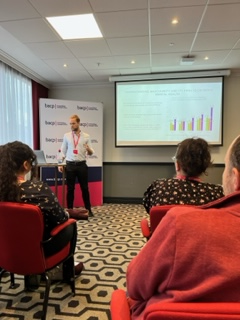2023 National Research Success
2023 Yet Another Year of LC&CTA Student Research Success
Once again LC&CTA’s L5 HPD students successfully submitted their Research Papers for presentation at the BACP Annual National Research Conference.
Representatives from each Research Sub-group presented their group paper at the Conference held in May this year.
Tutors Tina Corcoran and Chris Brown attended the 2-day event with the presenting students and celebrated their achievements with Dinner on LC&CTA.
We all learned from the Conference Presentations but had fun together too!





When James presented his group paper, he had offers from 3 Universities to continue his groups Research by perusing a Phd.
See our students’ three 2023 Research Abstracts below:


Presenters: Dorcas Upshall Other authors: Laura Murtagh, Rochelle Nartey
Professional role: Higher Professional Diploma Counsellors in Training Institution/affiliation: Lewisham Counselling & Counsellor Training Associates Email: biphobiaresearchgroup@gmail.com / Christine.Brown@lcandcta.co.ukAbstract: a collaborative student poster presentation Keywords: Bisexuality, women, LGBTQIA+, community, inclusion, biphobia
ABSTRACT
Title: What is the experience of bisexual women within the LGBTQIA+ community in relation to biphobia and can this inform psychotherapeutic practice?
Aim/purpose: This research aims to learn more about bisexual women’s experiences in the Lesbian, Gay, Bisexual, Transgender, Queer, Intersex, and Agender (LGBTQIA+) community, specifically whether they have been able to access LGBTQUIA+ spaces, their experiences in relation to biphobia, and our purpose is to inform psychotherapeutic practice.
Design and methodology: We recruited four participants through social media, all of which met the inclusion criteria. Semi-structured interviews were conducted over Zoom, recorded, and transcribed. Our data was thematically analysed and informed by phenomenological principles (Smith and Osborn, 2015).
Ethical approval:The Board of Ethics at our training institution approved our research submission, and we adhered to the BACP guidelines for psychotherapeutic research (BACP, 2019). Participants were offered six no-fee counselling sessions if issues arose due to participation in the research.
Results or findings: Our findings indicated that the majority of our respondents felt their bisexuality was misunderstood or not recognised, and/or they faced judgements for identifying as bisexual. They were perceived as “straight passing”, making it hard to “come out”, choosing instead to hide their identity in certain social circles. However, our research indicated that when participating within LGBTQIA+ spaces they had both positive and negative experiences, and all participants experienced both inclusivity and judgement and lack of inclusion, making it a complicated space to navigate.
Research limitations: Due to the small nature of our sample size our results may not be scalable to the greater population.
Conclusions or implications: Our research suggests that therapists should be mindful of the alienation and exclusion of the female bisexual experience and the difficulties faced in accessing the LGBTQIA+ community. Although women may have both positive and negative experiences once part of the community it can still be a complex experience.
Considerations given to issues of equality, diversity, and inclusion:
All participants identified as bisexual females who had had experience within the LGBTQIA+ community. No consideration was given to other diversity criteria. As interviews took place over Zoom participants did not have to travel to take part, improving accessibility.
Reference list:
BACP. (2019) Ethical Guidelines for Research in the Counselling Professions. Leicestershire: BACP McLeod, J. (2003) Doing counselling research, 2nd Edition. London: SAGE Publications Ltd. Smith J, Osborn M. (2015) Interpretative phenomenological analysis as a useful methodology for research on the lived experience of pain. Br J Pain 9(1):41-2.
Authors: James Yates, Gabriel Muller-Ebeid, Tania Gessi
ABSTRACT
In the experience of male-clients with suicidal ideation, what role did their concept of masculinity play in their experiences and their understanding of self, and how might this inform psychotherapeutic practice?
Presenters Professional Role: Higher Professional Diploma Student/Counsellors in Training
Institution/Affiliation: LC&CTA
Email: christine.brown@lcandcta.co.uk
Key words: cis-male/roles/identity/suicidal-ideation Aim: To achieve greater understanding of cis-male clients’ experiences of suicidal-ideation in relation to their concept/s of masculinity, and to discover if psychotherapy altered these concepts in any positive way/s. Our purpose is to further enlighten psychotherapeutic practitioners working with this client-group. Design: Four self-identified cis-males who had experienced suicidal-ideation responded during semi-structured interviews which were recorded, transcribed then analysed using thematic-analysis informed by IPA principles (Smith et al, 2009). Ethical approval: This was granted by our training institution’s Ethics Board prior to recruiting participants. BACP guidelines for research in counselling and psychotherapy were followed implicitly (Mitchels, 2018). Respondents were offered six no-fee counselling sessions if issues arose due to their participation in our research.Results: Our findings indicate that participants’ movement toward suicidal-ideation followed an identifiable pattern. In their childhood participants were subject to predefined masculine values/expectations from family/friends and society; the need to be self-reliant/be the breadwinner/be strong. These values/expectations were introjected by our participants and thus, created a self-concept, informed by external conditions-of-worth. When participants ‘failed’ to live up to these external values/expectations and their introjected self-concept they experienced traumatic feelings of shame and guilt. Our participants then developed dysfunctional coping strategies such as, substance-abuse and self-harm which ultimately led to suicidal-ideation. Psychotherapy appeared to help participants gain greater understanding of themselves and the conditions-of-worth that led them to suicidal-ideation. Participants' engagement in psychotherapy assisted their development of greater self-knowledge/understanding and a sense of freedom, as well as an ability to express themselves and ultimately changed their singular definition of ‘What it means to be a man’. Research limitations: The small number of research participants and the qualitative analysis of our data may impede the generalisation of our findings (McLeod, 2003). Conclusions and implications: For participants, self-acceptance and a self-defined classification of masculinity, appears to have been aided by engaging in psychotherapy. However, profound acceptance of the participants' experiences/views seemed to be a key factor in the effectiveness of therapy. Considerations given to issues of equality, diversity, and inclusion: To keep our study focussed, we included only cis-males who had received counselling/psychotherapy. However, we recognise the possibility for future research including other client-groups. References McLeod, J. (2003) Doing Counselling Research, 2nd Edition. London: SAGE Publications Ltd. Mitchels, B., (2018). Ethical Guidelines for Research in the Counselling Professions, Leicestershire: BACP.Smith, J., Flowers, P. and Larkin, M. (2009) ‘Interpretative Phenomenological Analysis; Theory, Method and Research.’ London: SAGE Publications Ltd.
FAYE (Dorcas) DEBORAH ALEX
ABSTRACT
Presenters: Alex Luckhurst & Faye Winter Other Authors: Sunah Akhtar, Deborah Roberts
Professional Role: Higher Professional Diploma Students/Counsellors in Training Institute/Affiliation: Lewisham Counselling and Counsellor Training Associates LLP Email: Christine.brown@lcandcta.co.uk Abstract: Collaborative Student/Tutor –Rapid Paper Key Words: Abusive behaviour, mental distress, co-dependency
Title: In clients' experiences what is/has been the impact of having a parent who displays/did display Narcissistic Personality Disorder behaviour and can this inform therapeutic practice?
Aim/Purpose: To explore how having a parent who displays/did display Narcissistic Personality Disorder (NPD) behaviour, as defined by the NHS as ‘A person....(who) swings between seeing themselves as special and fearing they are worthless’ ( www.nhsinform.scot/illness), and how this impacts/effects the self, significant relationships and therapeutic relationships. Our purpose is to better inform practitioners in relation to the issues that may arise with this client group. Design or Methodology Structure: Following BACP guidelines for research in counselling/psychotherapy (Mitchels 2018), four participants who self identified were interviewed using a semi-structured interviews process which was recorded on Zoom. The interviews were transcribed, and the resulting data was thematically analysed and informed by lPA principles (McLeod 2015). Ethical Approval: Our college ethics board granted approval for our research before we recruited our participants. Participants were offered six free counselling session if issues arose. Results or Findings: The impact of having a parent who displayed NPD on self, was mental distress including anxiety, depression, fear and self doubt. The impact on relationships included lack of trust and isolation. All four of our participants displayed co-dependent behaviour and three participants were emotionally reliant on their partners. All participants sought therapy to explore their experiences and a therapeutic relationship that extended the core conditions in unison helped to shift the client from an external to an internal locus of evaluation. It also enhanced self worth and trust in self and others. Research Limitations: The relatively small participant group may limit the generalisability of current and subsequent findings (McLeod 2015). Feedback/guidance on further/alternative analysis of data would be helpful. Conclusions or Implications: Having a parent with NPD negatively impacts/effects the self and significant relationships. Our findings indicated that respondents who experienced therapy stated it was helpful if the gender of the therapist was the same as the parent who displayed NPD. It would appear therapy offered our respondents support in understanding their experiences and helped to develop a greater sense of self. Our findings also indicated that practitioners may increase their effectiveness by being mindful of co-dependent behaviour. Considerations given to issues of equality, diversity and inclusion: Respondent recruitment was advertised on social media platforms and self-selected to engage in our project. Participants’ age ranged from twenty to fifty, however only White women responded therefore ethnic and gender diversity was not present. References McLeod, J. (2015). Doing Research in Counselling and Psychotherapy. London, SAGE Mitchels, B. (2018). Ethical Guidelines for Research in the Counselling Professions. BACP Publications